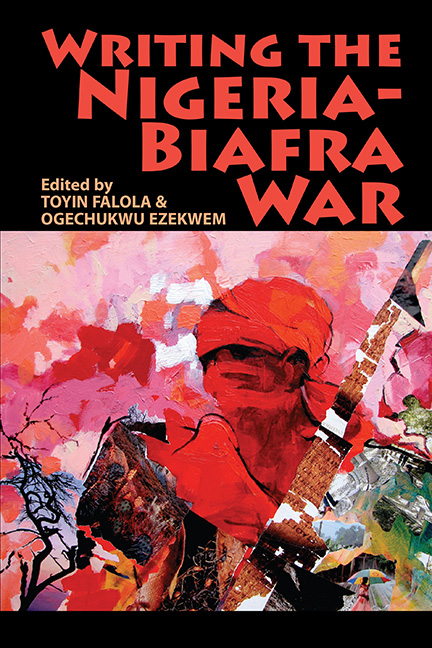Book contents
- Frontmatter
- Contents
- Notes on Contributors
- List of Abbreviations
- Timeline
- Map of Biafra 30 May 1967 – 1 May 1969
- 1 Scholarly Trends, Issues, and Themes: Introduction
- Part I On The History Of The Nigeria-Biafra War
- Part II Critical Debates On The Nigerian Crisis
- Part III The War In Fiction, Memoir, And Imagination
- Part IV Locating Gender In Nigeria-Biafra War Literature
- Select Bibliography
- Index
19 - Gender and the Construction of the Nigeria-Biafra War Scholarship
Published online by Cambridge University Press: 17 June 2021
- Frontmatter
- Contents
- Notes on Contributors
- List of Abbreviations
- Timeline
- Map of Biafra 30 May 1967 – 1 May 1969
- 1 Scholarly Trends, Issues, and Themes: Introduction
- Part I On The History Of The Nigeria-Biafra War
- Part II Critical Debates On The Nigerian Crisis
- Part III The War In Fiction, Memoir, And Imagination
- Part IV Locating Gender In Nigeria-Biafra War Literature
- Select Bibliography
- Index
Summary
‘The narrative of Nigeria's momentary disrepute and postulated disintegration, and of her supreme achievement in overcoming the threat – predominantly internal yet on occasion unmistakably external – to her sovereignty is one that seems destined to be retold many times in our lifetime.’
A.H.M. Kirk-Greene, Crisis and Conflict in Nigeria, vii.Introduction
The apt prediction made in March 1970 by A.H.M. Kirk-Greene was amply demonstrated both during the Nigeria-Biafra War (Nigerian Civil War) of July 1967 to January 1970 and in the four and a half decades after the cessation of hostilities. Indeed, each year witnesses the publication of fresh accounts of the war. Interest in the subject appears to have reached an all-time high in the last decade as the amount of research by individuals and institutions on different aspects of the conflict has increased tremendously. Issues investigated range from the legal implications of Biafra's secession to the variegated nature of the Biafra versus Nigeria conflict, and to the impact of the conflict on Igbo diaspora communities after the war. Scholars have extended the scope of their investigations on the war to include the interconnections between the Biafra dream for independence from Nigeria, which resulted in one of the world's bloodiest and most politicized twentieth century conflict, and the aspirations of second – and third-generation Biafrans – children or grandchildren of Biafrans born and raised decades after the conflict in different parts of the globe. Kirk-Greene could not have imagined the full range of the subjects and research themes that would flow from this singular event.
Many of the issues that triggered the Nigerian Civil War lie in the years preceding the actual fighting; some date as far back as the founding of the country, notably the supposed racial incompatibility of the North and South. In their analysis of the war, scholars have considered the period of actual fighting – from July 6, 1967 to January 15, 1970 – as well as a wide variety of happenings that occurred before the actual fighting. The war was of such magnitude that all classes of Biafran society felt the brunt of it, as did all gender groups within Biafra, irrespective of the age category.
Biafra, previously Eastern Region of Nigeria, was populated by the Igbo, Ijaw, Efik, Ibibio, Ekoi, and a few other smaller ethnic groups that seceded from the Nigerian federation, but divested non-Igbo segments just prior to the hostilities.
- Type
- Chapter
- Information
- Writing the Nigeria-Biafra War , pp. 403 - 422Publisher: Boydell & BrewerPrint publication year: 2016



